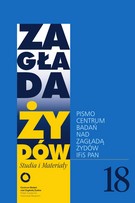Judith S. Kestenberg i ucieczka w (nie)pamięć o Zagładzie
Judith S. Kestenberg and escape into (un)memory of the Holocaust
Author(s): Klara NaszkowskaSubject(s): Gender Studies, Psychoanalysis, Studies in violence and power, WW II and following years (1940 - 1949), Fascism, Nazism and WW II, History of the Holocaust, Ethnic Minorities Studies, Politics of History/Memory, Politics and Identity, Peace and Conflict Studies
Published by: Stowarzyszenie Centrum Badań nad Zagładą Żydów & IFiS PAN
Keywords: Judith S. Kestenberg; extermination of Jews; Holocaust; emigration; identity; escape; trauma; psychoanalysis; oral history; personal history; feminism;
Summary/Abstract: This article reconstructs the biography and the complex, intercultural, and international identity of Judith S. Kestenberg (1910–1999) – a Polish Jew born in an Orthodox family in Galicia, Austria-Hungary; a medical student in Vienna; an emigrant to the United States; a pioneer of psychoanalysis and therapeutic work with Holocaust survivors, dealing with the trauma of a daughter of Holocaust victims; and, last but not least, a mother and wife. The text presents the complex circumstances of Kestenberg’s departure from Austria in mid-1937 and her metaphorical escapes from the unbearable reality of the war and the Holocaust, as well as her complicated, ambiguous, and evolving attitude toward the losses and traumas suffered as a result of the war, the Holocaust, and the emigration, as well as toward Jewish and Polish identity. The article presents Kerstenberg’s personal attitude toward the Shoah which resulted from her losing her parents and her obsessive dedication to therapeutic work with the Holocaust survivors. During the first post-war decades in the milieus of Jewish survivors, immigrants, and even mental health professionals (including psychoanalysts) dominant was the conviction that it was better to forget the war, trauma, and loss. In 1968 Kestenberg began to create a new field of knowledge dedicated to survivors who had experienced wartime persecutions at a very young age. She believed that the only way to deal with the difficult past events was to talk about them, acknowledge them, and preserve them in the individual and collective memory. The author reconstructed the history of Kestenberg’s family history and her biography on the basis of archival sources. Official historical sources usually ignore the voices and experiences of minorities, including women, Jews, immigrants, and non-citizens. This is why this article utilizes personal history materials such as memoirs, letters, published and unpublished interviews, and oral history (speeches, and the conversations I have had) as well as Kestenberg’s texts about her research on survivors.
Journal: Zagłada Żydów. Studia i Materiały
- Issue Year: 2022
- Issue No: 18
- Page Range: 296-321
- Page Count: 26
- Language: Polish

